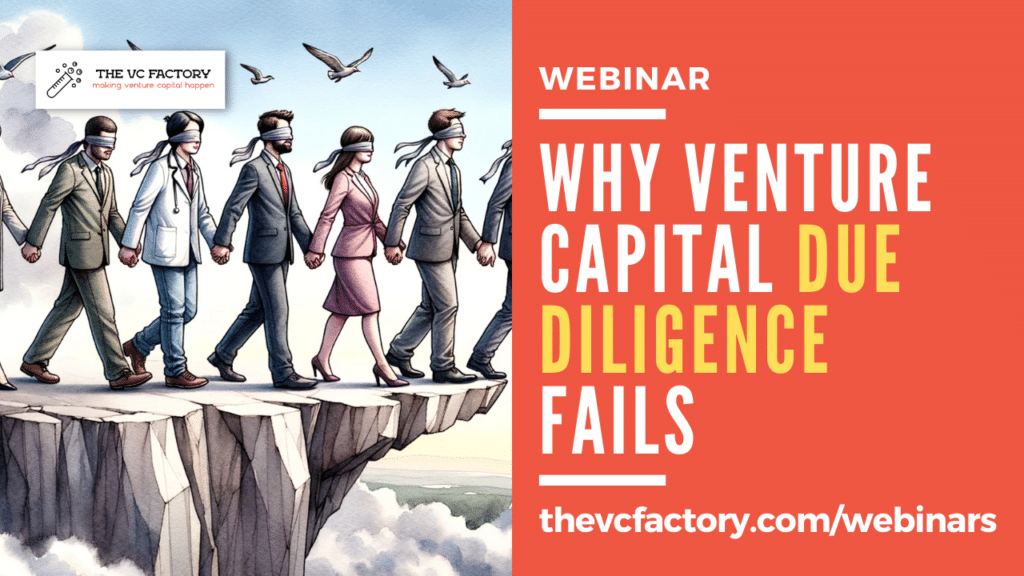Why Venture Capital Due Diligence Fails
- 4.3K views
- 11 minute read

Venture Capital due diligence is a critical process that ensures informed decision-making. By conducting thorough due diligence—involving market validation, financial and legal audits, and customer and reference checks—VCs can considerably reduce the information asymmetry with Founders, allowing them to make sound investment decisions. However, despite these precautions, there have been significant failures in recent years. Are they due to inexperience, incompetence, or are there subtler mental barriers at play?
In this post and the companion webinar, I delve into the pitfalls of due diligence, drawing from high-profile examples like Theranos, and highlight the importance of cultivating a "due diligence mind": a balance of skepticism and cautious trust, fostered by thorough audit processes. After discussing the two forms of due diligence (exploratory and confirmatory), I introduce my concept of "proxy due diligence" and explain why it happens. Lastly, I provide insights into how Venture Capitalists can overcome mental barriers that might impede effective data evaluation and interpretation.
In This Post
Accelerate Your Learning: Watch Our Webinar!
Don't just read about it, immerse yourself in the content through our companion webinar for this post! Engage with a multimedia presentation, discover all the referenced sources, and have your questions answered live! Click the "Watch Now" button to access the webinar.

Venture Capital Due Diligence 101: What, Why, When
Due diligence is the process of researching and verifying facts, as well as assessing any potential risks associated with an investment. This includes gathering data on the financial status of a business, verifying legal documents, and performing background checks on the Founders.
The main reason why VCs do due diligence is to ensure investments are safe and lucrative. It's also important to evaluate potential risks associated with the investment beforehand to minimize losses.
In the webinar, I go into more detail on the following three reasons behind due diligence:
- Reduce the information asymmetry between Founders and VCs
- Comply with fiduciary duties GPs hold toward their LPs but also other shareholders
- Save time (by allocating resources to promising opportunities) and money (before hiring external auditors)
VC Board Members' Legal Risks
To illustrate just one of these points here, I borrow from Scott Kupor's excellent book, Secrets of Sand Hill Road. Kupor lists four duties that VCs must abide by as Board members.
- The duty of care requires VCs to exercise reasonable prudence and diligence in making decisions for the benefit of their limited partners. This means that VCs must be informed about investments and oversee them closely to ensure that all partners are being treated fairly.
- The duty of loyalty also places an obligation on GPs to act in the best interests of their investors over those of management or themselves. This requires a shift in mindset from traditional business models where profits are prioritized above all else.
- The duty of confidentiality means that VCs must not disclose information about their fund or investments without prior consent from limited partners. This is especially important when it comes to proprietary data or deals in progress.
- Finally, Kupor explains the importance of the duty of candor when it comes to decision-making processes related to investments. He emphasizes the role it plays in maintaining effective communication between limited partners and GPs throughout fund operations.
Board members of private companies have a legal responsibility to act in the best interests of their limited partners, but also—and foremost—of the common stockholders. This means they must be diligent in their decision-making and exercise a reasonable judgment based on data at their disposition.
The board owes its fiduciary duties to the common stockholders.
Delaware Court of Chancery on the case of In Re Trados (Source: Thomson REuters)
The Trados case is a prime example of the legal risks board members take on when making decisions. In this case, the Board members were held personally liable for approving and negotiating a merger resulting in significant losses for the common stockholders—not the VCs, who benefited from a liquidation preference clause. The Delaware Court of Chancery found the Board to be deficient in its exit process, and ultimately determined that the interests of the common stockholders were not adequately protected.
While the Trados case does not apply to due diligence, it set a precedent regarding the fiduciarty duties of Board members.
I'll get back to these duties in a short while.
The Two Types of Venture Capital Due Diligence
Making an investment decision can be daunting for Investors. The problem with early-stage Venture Capital is that there is very little data to rely on. VCs have to interpret signals.
Contrary to large private equity transactions, where firms routinely hire strategic consultants early in the process, most VCs are highly involved in due diligence themselves. Audit work carried out for an early-stage VC investment can be divided in two phases.
Exploratory due diligence is the phase conducted by Investors early into the investment process. Investors typically conduct market research and analyze industry trends to get a better understanding of the startup's competitive environment and growth plan. They also get reference checks on the Founding Team. The goal of exploratory due diligence is to identify potential red flags and make a go/no-go decision on whether they should spend more time on the opportunity, and eventually extend a term sheet. The deal team's objective is to ultimately convince their Investment Committee to ok the deal.
Confirmatory due diligence is typically conducted after the term sheet has been signed. It is a more detailed examination focused on verifying information obtained during exploratory due diligence. Confirmatory due diligence typically involves a review of the company's financial statements, legal documents such as contracts, intellectual property records, and debt agreements (if relevant). Confirmatory due diligence is generally completed late in the funding process, just before making an investment decision.
In the webinar, I use Mark Suster's article on diligence and illustrate which portions are done by whom, when, and how.
Limitations on Venture Capital Due Diligence
I highlight, in the webinar, four limitations to even the best VC firms at this perilous exercise:
- Investors mostly rely on declarations by Founders
- They have limited time & resources to conduct their diligence
- Ambiguity trumps uncertainty
- Due diligence does not stop at Closing
Again, I'm not going to detail each of these points here, but I will add more color on what I mention in the video.
Representations and warranties are one way Investors (and acquirers) try to mitigate the first point. The Reps & Warranties clause, as it is usually named, is a series of statements made by the Founders to Investors, as well as a compensation mechanism in case these facts or material matters are not true and correct. The purpose is to ensure that the Investor is properly informed about potential liabilities or claims that may arise against the company after Closing. The clause typically covers such matters as title to assets, important contracts, legal compliance, financial statements and disclosures, corporate authority, employee terms and conditions, intellectual property rights, and tax filings. If any of these items are not accurate or disclosed at the time of the transaction they could lead to disputes between the parties down the road—including an exchange of cash or shares to compensate the Investors.
A breach of the fiduciary duty of loyalty is established by evidence that the Board directors knew or should have known compliance violations were occurring and took no preventative or remedial steps.
Brent T. Wilson (Source: Idaho State Bar)
Due diligence never stops. The recent case of Theranos illustrates the importance of complying with the fiduciary duties mentioned earlier. Board members failed to properly oversee the company's operations and alert stakeholders about false information regarding the company's blood-testing device. Despite not being sued directly, directors suffered immense damage to their reputation due to the fraud committed by Theranos executives, culminating in former defense secretary James Mattis being forced to give embarrassing testimony in court.
What Is Proxy Due Diligence And Why Does It Happen?
"Proxy due diligence", as I call it, is the practice of relying on others to do the required diligence for a transaction. It may be acceptable, and even the norm, in some cases (think of co-investors following a lead VC firm into a new transaction). However, it also is one of the primary causes of due diligence failure—in particular in the Venture Capital context, which has unique characteristics I mention below (and, you guessed it, in the webinar).
The Context Behind Proxy Due Diligence in Venture Capital
You've reached a Members-only area.
Unlock Full Access
Discover exclusive content curated for Venture Capital professionals and enthusiasts. Join our community and gain unlimited access to in-depth articles, expert guest interviews, MBA-level webinars, and networking opportunities.
Register for our 7-Day Free Trial: Click Here
Already a member? Please Log In Below:
Subscribe to our Newsletter
Join 12,000+ VCs & Founders globally who enjoy our weekly digest on Venture Capital. We keep your information confidential and you can unsubscribe at any time. Sweet!